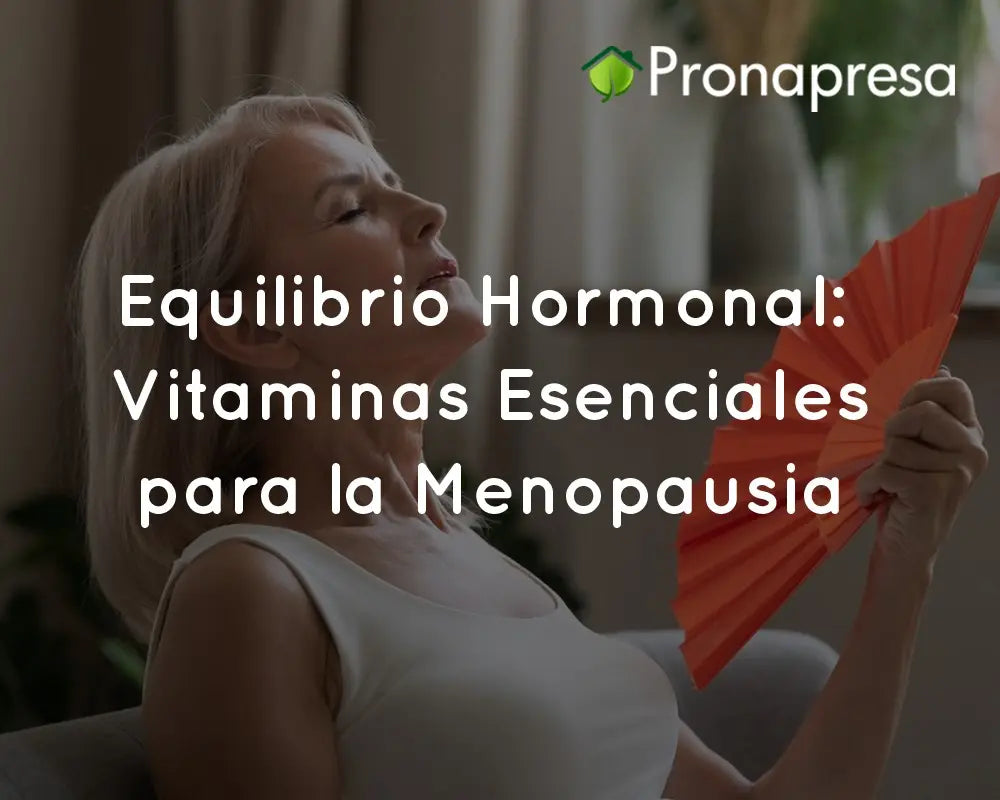
Menopause is a significant time in a woman's life. It is a natural process that marks the end of reproductive capacity and is associated with a series of hormonal and physical changes. As the body adapts to this transition, it is important to pay attention to overall health and ensure you are getting the nutrients you need to maintain balance and well-being. Among these nutrients, vitamins play a vital role.
In this article, we'll explore essential vitamins for menopause and how they can help women navigate this stage with greater comfort and health.
Vitamin D: Support for Bone Health
Vitamin D is essential for bone health at all stages of life, but its importance is magnified during menopause. During this period, women are at increased risk of bone loss due to declining estrogen levels. Vitamin D helps the body absorb calcium, which is critical for maintaining bone density and preventing osteoporosis, a common concern during menopause.
In addition to strengthening bones, vitamin D also plays a role in muscle, immune, and cardiovascular health. Moderate sun exposure is a natural source of vitamin D, but many people don't get enough sun exposure, especially at certain times of the year or in areas with long winters. Therefore, it's important to consider vitamin D supplements, especially during menopause.
[product=v-collagen-vital-health]
An ally for your body, in addition to containing hydrolyzed collagen and lysine as its main ingredients, it also contains vitamins that promote health. It supports bone health.
[/product]
Vitamin E: Relief from Vasomotor Symptoms
Vasomotor symptoms, such as hot flashes and night sweats, are common during menopause and can significantly affect quality of life. Vitamin E has been the subject of interest due to its potential to alleviate these symptoms. Vitamin E helps regulate estrogen levels and acts as an antioxidant, protecting cells from damage caused by free radicals.
[product=mpsin]
It strengthens the female reproductive system and bones, helps prevent the discomfort of menopause and some symptoms of premenstrual syndrome (PMS).
[/product]
Vitamin C: Antioxidant Support and Stress Reduction
Vitamin C is known for its role in the immune system and its ability to fight free radicals, but it may also be beneficial during menopause for other reasons. During this time, many women experience increased stress due to hormonal changes and the emotional challenges associated with the transition. Vitamin C may help reduce stress by regulating levels of cortisol, the stress hormone, in the body.
Additionally, vitamin C is essential for the production of collagen, a protein that maintains the elasticity of skin and connective tissue. As women age and experience menopause, collagen production can decline, leading to dry skin, wrinkles, and other signs of aging. Vitamin C can help counteract these effects by promoting collagen production and keeping skin healthy and radiant.
[product=vitamin-c-500mg]
Boosts your immune system and promotes the elimination of free radicals
[/product]
B Complex: Energy and Hormonal Balance
The B complex includes a group of essential vitamins that play an important role in a variety of bodily functions, including energy production, nervous system health, and hormonal balance. During menopause, many women experience changes in hormone levels that can cause symptoms such as fatigue, irritability, and sleep problems.
B vitamins, such as B6, B12, and folic acid, are especially important during this time to help maintain hormonal balance and promote emotional health. These vitamins are also involved in the production of neurotransmitters like serotonin, which influence mood and emotional well-being. Additionally, B vitamins are crucial for converting food into energy, which can help combat fatigue and boost energy levels during menopause.
[product=garlic-and-omega-super-b]
Strengthens the nervous system, relieves anxiety, depression and prevents heart disease.
[/product]
Calcium: Bone and Cardiovascular Strengthening
Calcium is another essential nutrient for bone health, and its importance during menopause cannot be overstated. As estrogen levels decline, women are at greater risk for bone loss and osteoporosis. Calcium is the main mineral component of bones, so getting enough is crucial to maintain bone density and prevent fractures and other osteoporosis-related complications.
In addition to its role in bone health, calcium is also important for cardiovascular health. Calcium has been shown to help regulate blood pressure and prevent heart disease, which can become more common during menopause. However, it's important to note that calcium doesn't work alone; vitamin D, magnesium, and vitamin K are also important for optimal calcium absorption and metabolism in the body.
[product=glucosamine-3-in-1-reinforced-with-garlic]
100% natural anti-inflammatory, analgesic and anti-rheumatic food supplement.
[/product]























































